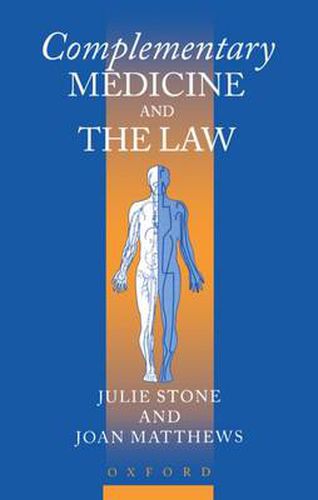Readings Newsletter
Become a Readings Member to make your shopping experience even easier.
Sign in or sign up for free!
You’re not far away from qualifying for FREE standard shipping within Australia
You’ve qualified for FREE standard shipping within Australia
The cart is loading…






The growth of complementary medicine over the past decade has been accompanied by calls for greater regulation. To date, discussions on regulation have confined themselves to the parameters set by orthodox medicine, and a result, critical issues which need to be more publicly aired have been overlooked. The first book to address this increasingly important topics, Complementary Medicine and the Law is a timely response to this need. The authors explore the way in which the law presently affects the practice of complementary medicine. At the heart of the book is a challenging of the notion that the legal and regulatory mechanisms which govern orthodox medicine form an appropriate model for the regulation of most complementary therapies. The patient-centred, holistic approach central to the theory and practice of many complementary therapies presents a unique problem for the law: the highly individualised, more intuitive, whole-person approach of complementary medicine is not amenable to the quantification and certainty required by the law. The authors argue that only by implementing a more dynamic form of ethics-directed regulation can the consumer be protected without sacrificing the unique contribution that complementary medicine has to make.
$9.00 standard shipping within Australia
FREE standard shipping within Australia for orders over $100.00
Express & International shipping calculated at checkout
The growth of complementary medicine over the past decade has been accompanied by calls for greater regulation. To date, discussions on regulation have confined themselves to the parameters set by orthodox medicine, and a result, critical issues which need to be more publicly aired have been overlooked. The first book to address this increasingly important topics, Complementary Medicine and the Law is a timely response to this need. The authors explore the way in which the law presently affects the practice of complementary medicine. At the heart of the book is a challenging of the notion that the legal and regulatory mechanisms which govern orthodox medicine form an appropriate model for the regulation of most complementary therapies. The patient-centred, holistic approach central to the theory and practice of many complementary therapies presents a unique problem for the law: the highly individualised, more intuitive, whole-person approach of complementary medicine is not amenable to the quantification and certainty required by the law. The authors argue that only by implementing a more dynamic form of ethics-directed regulation can the consumer be protected without sacrificing the unique contribution that complementary medicine has to make.